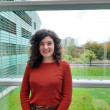Zoeken
Filteren op
Type
Labels
Dossiers
Thema's
Afdelingen
Taal
Active filters
1721 zoekresultaten
Zoekresultaten
-
Nature research and society
NIOO has a vigorous and long-standing commitment to societal impact. Not only is NIOO housed in a sustainable building designed to translate our ecological principles in terms of architecture and construction, we also have a number of units that are tailor-made for disseminating our ecological knowledge to specific target groups, we have a very active outreach policy, and we actively involve citizens in our research through large-scale citizen-science projects.
-
Board, organogram and advisory boards
Board, organogram and advisory boards -
History of NIOO-KNAW
NIOO-KNAW was created in 1992 by merging three important ecological research institutes of the Royal Netherlands Academy of Arts and Sciences (KNAW). Discover our history. -
Facts and figures
Feiten en cijfers -
Mission, vision and core values
To perform leading ecological research on biodiversity, climate change and sustainable use of land and water, to stimulate ecological research in The Netherlands and to share ecological knowledge with society.
-
Samenwerkingsverbanden
De samenwerkingsverbanden van het NIOO -
Robin Lexmond
PhD Candidate
-
Signatures of exposure to pollutants and diseases in urban and rural habitats
Urban environments are ever expanding and differ markedly from natural and rural ecosystems. We study how exposure to toxins, the prevalence of zoonotic pathogens, and the interaction between these stressors differs between these contrasting environments in birds.
-
GooseModel: Towards sustainable management of geese in Europe
The increasing impact caused by migratory and sedentary goose populations to economic activities and natural ecosystems in Europe has been a reason of concern for many governments.
-
Towards understanding the migratory system of birds: a modern displacement experiment
Migratory birds show a suite of innate dispositions that enable them to travel between breeding, staging and wintering grounds. However, we still lack a good understanding of the cues that migratory birds use to orient and navigate.
